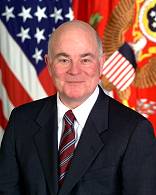-
(单词翻译:双击或拖选)
By Al Pessin
Pentagon
09 October 2006
The U.S. military had little reaction to Monday's North Korean claim that it had conducted a nuclear test. But one senior official said it does not change existing contingency1 plans, and a Washington-based analyst2 says the main U.S. response will not be military.
----
 Secretary of the Army Francis Harvey |
||
"It doesn't change the existing plans," said Secretary Harvey. "We have detailed3 plans. I don't think it changes the conventional deterrent4, as far as the detailed plans go. We can't discuss war plans, but we have, as you can imagine, we have war plans for every contingency you can imagine. But, it's certainly a development that we wish wouldn't have happened, for sure."
Other senior defense5 officials declined to comment on the North Korean explosion. The commander of U.S. forces in Korea made a speech in Washington on Monday, but he did not mention the test, and he avoided reporters afterwards.
In the speech, General B.B. Bell did make a timely statement about the determination of U.S. forces to address all the threats they face around the world.
"There's no backing down here for GI Joe [the American soldier]," said General Bell. "The stakes are too great, the consequences of failure too catastrophic."
In the past, U.S. officials, including Defense Secretary Donald Rumsfeld, have expressed concern about the possibility that North Korea could become a nuclear power. But officials and experts also point out that there is a difference between being able to create a nuclear explosion, and being able to put a nuclear weapon on a missile that could deliver it, accurately6, to a target.
Many U.S. experts believe North Korea is at least a year away from being able to do that, perhaps much more. But last year, the head of the Defense Intelligence Agency told the congress he believed North Korea already had the ability to launch a nuclear armed missile at that time. That was a year before North Korea's series of missile tests in July.
Analyst Michael O'Hanlon, of Brookings Institution, says the North Korean explosion Monday creates more of a diplomatic opening for the United States than a military one.
"The U.S. military response can not be the central element here, because it just makes no sense to go out and destroy a North Korean test site since they could always build another," said Michael O'Hanlon. "And we don't know where their nuclear weapons are, so therefore we can't really attack them. So I think there's an entirely7 distinct possibility of some kind of symbolic8 or stabilizing9 response, adding a few hundred more American troops or a couple more Patriot10 defense batteries or what have you. But I think the core of our approach has to be to try to convince South Korea and China to get tougher economically and diplomatically with the North."
O'Hanlon also believes North Korea does not intend to use, or even sell, its apparent new capability11, but rather to use it for diplomatic leverage12.
"I think what they're really trying to do in all likelihood is create a new bargaining chip in their arsenal13, in their diplomatic arsenal," he said. "The military benefit, or potential military benefit, the potential sale of nuclear material that they also now have open to them, these are much less likely to be real choices the North Koreans would take."
Meanwhile, the U.S. Pacific Command in Hawaii is not commenting on any additional security measures it might be taking. In August, a senior U.S. Air Force officer in charge of long-range bombers14 based on the Pacific island of Guam said North Korea is part of the usual set of potential targets his forces train to attack. The officer said there was no need to increase his troops' level of readiness after July's missile tests because his bombers are already ready to hit North Korea, or any other target in their range, on a moment's notice.
 收听单词发音
收听单词发音
1
contingency

|
|
| n.意外事件,可能性 | |
参考例句: |
|
|
|
2
analyst

|
|
| n.分析家,化验员;心理分析学家 | |
参考例句: |
|
|
|
3
detailed

|
|
| adj.详细的,详尽的,极注意细节的,完全的 | |
参考例句: |
|
|
|
4
deterrent

|
|
| n.阻碍物,制止物;adj.威慑的,遏制的 | |
参考例句: |
|
|
|
5
defense

|
|
| n.防御,保卫;[pl.]防务工事;辩护,答辩 | |
参考例句: |
|
|
|
6
accurately

|
|
| adv.准确地,精确地 | |
参考例句: |
|
|
|
7
entirely

|
|
| ad.全部地,完整地;完全地,彻底地 | |
参考例句: |
|
|
|
8
symbolic

|
|
| adj.象征性的,符号的,象征主义的 | |
参考例句: |
|
|
|
9
stabilizing

|
|
| n.稳定化处理[退火]v.(使)稳定, (使)稳固( stabilize的现在分词 ) | |
参考例句: |
|
|
|
10
patriot

|
|
| n.爱国者,爱国主义者 | |
参考例句: |
|
|
|
11
capability

|
|
| n.能力;才能;(pl)可发展的能力或特性等 | |
参考例句: |
|
|
|
12
leverage

|
|
| n.力量,影响;杠杆作用,杠杆的力量 | |
参考例句: |
|
|
|
13
arsenal

|
|
| n.兵工厂,军械库 | |
参考例句: |
|
|
|
14
bombers

|
|
| n.轰炸机( bomber的名词复数 );投弹手;安非他明胶囊;大麻叶香烟 | |
参考例句: |
|
|
|















